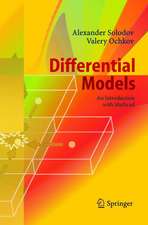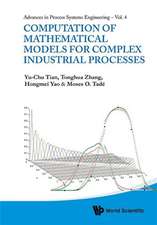Intelligent Systems for Knowledge Management: Studies in Computational Intelligence, cartea 252
Editat de Edward Szczerbickien Limba Engleză Paperback – 14 mar 2012
| Toate formatele și edițiile | Preț | Express |
|---|---|---|
| Paperback (1) | 946.72 lei 43-57 zile | |
| Springer Berlin, Heidelberg – 14 mar 2012 | 946.72 lei 43-57 zile | |
| Hardback (1) | 952.89 lei 43-57 zile | |
| Springer Berlin, Heidelberg – 30 sep 2009 | 952.89 lei 43-57 zile |
Din seria Studies in Computational Intelligence
- 20%
 Preț: 449.37 lei
Preț: 449.37 lei - 20%
 Preț: 1158.26 lei
Preț: 1158.26 lei - 20%
 Preț: 986.66 lei
Preț: 986.66 lei - 20%
 Preț: 1452.76 lei
Preț: 1452.76 lei - 20%
 Preț: 168.78 lei
Preț: 168.78 lei - 20%
 Preț: 1291.10 lei
Preț: 1291.10 lei - 18%
 Preț: 1112.30 lei
Preț: 1112.30 lei - 20%
 Preț: 565.39 lei
Preț: 565.39 lei - 20%
 Preț: 649.28 lei
Preț: 649.28 lei - 20%
 Preț: 1047.73 lei
Preț: 1047.73 lei - 20%
 Preț: 1578.96 lei
Preț: 1578.96 lei - 20%
 Preț: 643.50 lei
Preț: 643.50 lei - 20%
 Preț: 657.49 lei
Preț: 657.49 lei - 20%
 Preț: 993.28 lei
Preț: 993.28 lei - 20%
 Preț: 990.80 lei
Preț: 990.80 lei - 20%
 Preț: 989.96 lei
Preț: 989.96 lei - 20%
 Preț: 1165.69 lei
Preț: 1165.69 lei - 20%
 Preț: 1444.52 lei
Preț: 1444.52 lei - 20%
 Preț: 1041.96 lei
Preț: 1041.96 lei - 20%
 Preț: 1047.73 lei
Preț: 1047.73 lei - 20%
 Preț: 1046.06 lei
Preț: 1046.06 lei - 18%
 Preț: 2500.50 lei
Preț: 2500.50 lei - 20%
 Preț: 989.13 lei
Preț: 989.13 lei - 20%
 Preț: 1165.69 lei
Preț: 1165.69 lei - 20%
 Preț: 1164.05 lei
Preț: 1164.05 lei - 20%
 Preț: 1042.79 lei
Preț: 1042.79 lei - 20%
 Preț: 1460.19 lei
Preț: 1460.19 lei - 18%
 Preț: 1403.52 lei
Preț: 1403.52 lei - 18%
 Preț: 1124.92 lei
Preț: 1124.92 lei - 20%
 Preț: 1039.47 lei
Preț: 1039.47 lei - 20%
 Preț: 1008.11 lei
Preț: 1008.11 lei - 20%
 Preț: 1045.25 lei
Preț: 1045.25 lei - 20%
 Preț: 1275.42 lei
Preț: 1275.42 lei - 20%
 Preț: 1040.32 lei
Preț: 1040.32 lei - 20%
 Preț: 988.32 lei
Preț: 988.32 lei - 20%
 Preț: 1169.79 lei
Preț: 1169.79 lei - 20%
 Preț: 1162.37 lei
Preț: 1162.37 lei - 20%
 Preț: 1059.26 lei
Preț: 1059.26 lei - 20%
 Preț: 1164.05 lei
Preț: 1164.05 lei - 20%
 Preț: 1166.52 lei
Preț: 1166.52 lei - 20%
 Preț: 1459.38 lei
Preț: 1459.38 lei - 18%
 Preț: 1005.74 lei
Preț: 1005.74 lei - 20%
 Preț: 997.38 lei
Preț: 997.38 lei - 20%
 Preț: 1055.94 lei
Preț: 1055.94 lei - 20%
 Preț: 1284.47 lei
Preț: 1284.47 lei - 20%
 Preț: 994.08 lei
Preț: 994.08 lei - 20%
 Preț: 1048.72 lei
Preț: 1048.72 lei - 20%
 Preț: 1066.02 lei
Preț: 1066.02 lei - 20%
 Preț: 943.78 lei
Preț: 943.78 lei - 20%
 Preț: 1173.10 lei
Preț: 1173.10 lei
Preț: 946.72 lei
Preț vechi: 1154.54 lei
-18% Nou
Puncte Express: 1420
Preț estimativ în valută:
181.21€ • 196.90$ • 152.32£
181.21€ • 196.90$ • 152.32£
Carte tipărită la comandă
Livrare economică 21 aprilie-05 mai
Preluare comenzi: 021 569.72.76
Specificații
ISBN-13: 9783642260636
ISBN-10: 3642260632
Pagini: 344
Ilustrații: XII, 331 p.
Dimensiuni: 155 x 235 x 18 mm
Greutate: 0.48 kg
Ediția:2010
Editura: Springer Berlin, Heidelberg
Colecția Springer
Seria Studies in Computational Intelligence
Locul publicării:Berlin, Heidelberg, Germany
ISBN-10: 3642260632
Pagini: 344
Ilustrații: XII, 331 p.
Dimensiuni: 155 x 235 x 18 mm
Greutate: 0.48 kg
Ediția:2010
Editura: Springer Berlin, Heidelberg
Colecția Springer
Seria Studies in Computational Intelligence
Locul publicării:Berlin, Heidelberg, Germany
Public țintă
ResearchCuprins
Learning Automata-Based Solutions to Stochastic Nonlinear Resource Allocation Problems.- Neural Networks in Model Predictive Control.- Application of a Multi-domain Knowledge Structure: The Decisional DNA.- Intelligent-Based Mobility Models for Data Management in Wireless Sensor Networks.- Abductive Inference Based Approach to DSS Designing for Project Portfolio Planning.- CSP Techniques for Solving Combinatorial Queries within Relational Databases.- Predictive Capabilities of Adaptive and Evolutionary Fuzzy Cognitive Maps - A Comparative Study.- An Architecture for the Semantic Enhancement of Virtual Engineering Applications.- Effective Backbone Techniques for Ontology Integration.- Cluster Analysis in Personalized E-Learning Systems.- Agent-Based Modelling and Analysis of Air Traffic Organisations.- Identification of Contact Conditions by Active Force Sensing.- Modelling User-Centric Pervasive Adaptive Systems – The REFLECT Ontology.
Textul de pe ultima copertă
New approaches are needed that could move us towards developing effective systems for problem solving and decision making, systems that can deal with complex and ill-structured situations, systems that can function in information rich environments, systems that can cope with imprecise information, systems that can rely on their knowledge and learn from experience - i.e. intelligent systems. One of the main efforts in intelligent systems development is focused on knowledge and information management which is regarded as the crucial issue in smart decision making support. The 13 Chapters of this book represent a sample of such effort. The overall aim of this book is to provide guidelines to develop tools for smart processing of knowledge and information. Still, the guide does not presume to give ultimate answers. Rather, it poses ideas and case studies to explore and the complexities and challenges of modern knowledge management issues. It also encourages its reader to become aware of the multifaceted interdisciplinary character of such issues. The premise of this book is that its reader will leave it with a heightened ability to think - in different ways - about developing, evaluating, and supporting intelligent knowledge and information management systems in real life based environment.
Caracteristici
Presents latest results on intelligent systems for knowledge management



















